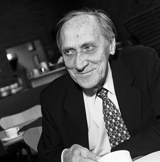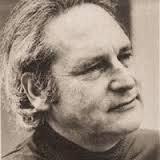Is God Happy?
Posted on 07 May 2013, 14:29
That’s the title of an interesting article by a Polish philosopher Leszek Kolakowski. But we are not going to get a meaningful answer until we sort out what we are doing when we use the word “God.” Failure to do this poses us with all sorts of insoluble conundrums, including the perennial Problem of Evil: namely, how can a good God permit evil? Let Kolakowski ask the question, then let Lawrence LeShan, and St Stephen suggest the answer.
“Some theologians,” Kolakowski (below) writes, “have argued that we can speak of God only by negation: by saying what He is not. Similarly, perhaps we cannot know what Nirvana is and can only say what it is not. Yet it is hard to be satisfied with mere negation; we would like to say something more. And assuming that we are allowed to say something about what it is to be in the state of Nirvana, the hardest question is this: Is a person in this state aware of the world around him? If not—if he is completely detached from life on earth—what kind of reality is he a part of? And if he is aware of the world of our experience, he must also be aware of evil, and of suffering. But is it possible to be aware of evil and suffering and still be perfectly happy?

The same question arises with regard to the happy residents of the Christian heaven. Do they live in total isolation from our world? If not—if they are aware of the wretchedness of earthly existence, of the dreadful things that happen in the world, its diabolical sides, its evil and pain and suffering—how can they be happy in any recognizable sense of the word?”
Kolakowski asks the hard question. To answer we need once again to go to Lawrence LeShan’s Alternate Realities of which there are four: the sensory-physical world of the light of day, where good and evil, right and wrong most certainly are real, then the reality of the Transpsychic, or that of prayer, then the reality of symbolism and language, and then finally the clairvoyant or holistic reality. But when we come to ask whether God is happy, we are placing God in a sensory-physical environment. It is, however, a wrong question, because God is that which is in all, through all and above all. The reality of God is apparent in universality; and it is to that everywhere/holistic God we come in prayer when great disasters strike us. It is said for instance that this was very evident in Aceh, in Western Indonesia, where over 170,000 people were killed by tsunami and about 500,000 were left homeless; that far from doubting God, they found strength in prayer. As I suggested in the previous blog, they were transcending themselves to their “higher” “wider” “eternal” selves.. even their “true” or “divine” selves. And this can happen when we meditate or pray.
On page 94 LeShan (below) writes: “Three classes of people work in this [clairvoyant/holistic] mode: These are theoretical physicists working with relativity theory trying to understand how reality works; mystics attempting to experience their oneness with the universe, and clairvoyants attempting to obtain paranormal information.”

We perhaps remember John Bell’s theorem that affirms universal causation, rather than individual chains of cause and effect. But let LeShan speak for himself. On page 92 he writes:
1. “All objects and events are part of the fabric of the total of being and cannot be meaningfully separated from it. The most important aspect of any object or event is that it is part of the total ONE and it is to be primarily considered under this aspect. Considering it under any other aspect is an error.
2. Boundaries, edges, and borders do not exist. All things primarily are each other, since they are primarily one.
3. This lack of boundaries applies to time also. Divisions of time, including divisions into past, present, and future, are errors and delusion. Events do not “happen” or “occur,” they “are.”
4. Since no object or event can be considered in itself without considering the all of space-time, the concepts of good and evil do not have meaning. Any application of them would automatically mean the application applies to the total context of being, to everything. The universe cannot be categorised in this way.
5. All forces or situations in space-time, or places where the fields of activity are weak or strong, move with dynamic company with each other. The very fact of the universe as a flow-process universe means of moves with harmony.
6. One can only be fully in this mode when one has, if only for a moment, given up all wishes and desires for oneself (since the separate self does not exist) and for others (since they do not exist as separate either) and just allows oneself to be and therefore to be with and be one with the all of existence. To attain this mode, one must – at least momentarily – give up on doing and accept being. Any awareness of doing or the wish to do disrupts this mode.
7. Valid information is not through the senses, but through a knowing of the oneness of observer and observed, spectator and spectacle. Once this complete oneness is fully accepted, there is nothing that can prevent the flow of information between a thing and itself.
8. The senses give a false picture of reality. They show separation of objects and events in space and time. The more completely we understand reality, the less it resembles the picture given by our senses, by the sensory mode of being.
9. This is the only valid way to regard reality. All other ways of are illusion.”
[But when we are thinking in the sensory-physical mode, that mode then seems to be the only valid way to regard reality.]
The clairvoyant/holistic mode, as said, is familiar to theoretical physicists, mystics and meditators, and to psychics. It is also the mode in which we experience “God”, in all, through all, and above all. So then, can we ask, “Is God happy?” If we did that would be like asking, “Is the Universe happy?
In Afterlife Teaching we find St Stephen devoting much of his teaching to helping us get our heads around what it means to live largely in Stephen’s reality, (LeShan’s clairvoyant/holistic mode) which Stephen regards as the basic reality. If we are familiar with Plato, and with QM physicists such as David Bohm and F. David Peat, we will find them agreeing with Stephen about the clairvoyant/holistic world being the “implicate” world, and agreeing that this world or mode brings the sensory-physical world into being. This sensory-physical world in which most of our conscious activity takes place, is a kind of projection or dream of the clairvoyant or implicate world. We become most aware of this fact when we experience striking synchronicities which appear to defy physical possibilities. Stephen regards this world as illusory, and unreal. It is his eternal holistic timeless world which is real. That is not to say that our “dreamed and projected” world is without value. The God who is in all, through all, and above all, has created it for very good reasons, as an arena where the soul can gain experiences vital for its health and growth. “Guidance through pain toward love,” said Stephen. The soul is eternal, not limited by time and space.

Some of this seems to be said in the Gospel of John 1.1: “In the beginning was the Word, and the Word was with God, and the Word was God. He was with God in the beginning. Through him all things were made; without him nothing was made that has been made. In him was life, and that life was the light of all mankind. The light shines in the darkness, and the darkness has not overcome it.”
If you like, “the Word”, “Christ”, “Anointing Spirit”, these creative agencies, can be compared to Plato’s Ideal Forms, or to Bohm’s Implicate Order. Whatever term we use, we are saying that the Eternal brings the events of time and space into being. Stephen expresses it by saying that the events of this world are brought into being by Christ. St John calls it “the Word.”
John 18.36: Jesus said, “My kingdom is not of this world. If it were, my servants would fight to prevent my arrest by the Jewish leaders. But now my kingdom is from another place.”
Philippians 3.20: “For our citizenship is in heaven, from which we also eagerly wait for the Saviour, the Lord Jesus Christ, who will transform our lowly body that it may be conformed to His glorious body.”
I am very conscious that readers of this blog will have a strong interest in psychic and afterlife research. They will have seen much good evidence of what to expect when we die, and experiences that we are likely to have after death. We are told that our spiritual development at the time of death will determine whether our risen self will find itself in higher or lower spheres. We are given convincing evidence that the departed can communicate with the living. Those involved in the Stephen experience accept that we are hearing from that individual who was martyred 2000 years ago. In contrast however, when we talk about “Christ’s Kingdom” or the clairvoyant/holistic mode of reality, we are talking about the context in which all of this comes about. It could be said that psychic research is more concerned with the particular, and that spirituality is more concerned with the Whole.
Spirituality is of course very much concerned with our relationships in the here and now. But one needs to see these relationships in the context of the eternal “Kingdom of Heaven.”
I have to say that eight years conversations with Stephen about the spiritual life led us back to a deeper understanding of Jesus’ Sermon on the Mount, to both its simplicity, and the challenge to take it into our spiritual development.
Kolakowski’s article translated from the Polish
http://www.nybooks.com/articles/archives/2012/dec/20/is-god-happy
Michael Cocks edits the journal, Ground of Faith.
Afterlife Teaching From Stephen the Martyr by Michael Cocks is published by White Crow Books and available from Amazon and other bookstores.
Paperback Kindle

Read comments or post one of your own
|